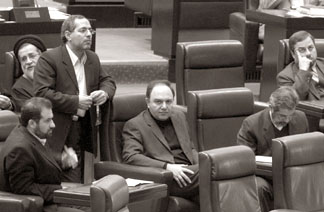|
observer |
|
|
|
|
|
OTHER LINKS |

|

|

|
Iran to revise nuclear ties with U.N.Iran's parliament voted to urge the government to re-examine its ties with the U.N. nuclear agency following a Security Council decision to impose sanctions against Tehran over its disputed nuclear program.
The move Wednesday signalled that Iran was likely to reduce its cooperation with the Vienna-based International Atomic Energy Agency. Iranian state radio predicted that once the bill came into effect, "the agency will become an ineffective and weak body." The vote came four days after the Security Council voted to impose limited sanctions on Iran for its refusal to cease enrichment of uranium - a process that produces the material for either nuclear reactors or bombs. The United States and its European allies suspect Iran's civilian nuclear program is a cover for developing a nuclear bomb. Iran says its program is strictly for generating electricity. The White House criticized the parliament decision, with U.S. Deputy Press Secretary Scott Stanzel saying it would "worsen the situation in the eyes of the world." "It's hard to see how such a downward spiral is in the interest of the Iranian people. We hope, therefore, that the Iranian regime will set aside threats and confrontation and immediately cooperate with all the requirements of the Security Council," he said. France said the vote was "not what we expected from Iran." French Foreign Ministry spokesman Denis Simonneau said the U.N. resolution requires Iran to cooperate fully with the IAEA. The vote also came as Iran's foreign minister delivered a letter from hardline President Mahmoud Ahmadinejad to Pope Benedict XVI at the Vatican discussing the U.N. sanctions, Iran's state-run IRNA news agency said. Details of the letter were not released, but the Vatican said the pontiff stressed his apolitical role in his brief meeting with Foreign Minister Manouchehr Mottaki. National interestsThe bill passed by parliament said the government was "obliged to accelerate the country's peaceful nuclear program and revise its cooperation with the International Atomic Energy Agency based on national interests." The bill was quickly approved by the Guardian Council, a constitutional watchdog controlled by hard-line clerics, said deputy speaker Mohammad Reza Bahonar. It will take effect 15 days after it is signed Ahmadinejad, an ardent champion of Iran's nuclear program. A special committee was formed to determine how to implement the law, but it was unclear what steps Iran would take. Legislators and newspapers have speculated that Tehran might restrict IAEA inspections of its nuclear facilities, cutting the number of inspections and barring inspectors from certain sites. "Today, Iran's Supreme National Security Council formed a committee to study aspects of the law and make decisions based on the situation," Ali Larijani, Iran's top nuclear negotiator, was quoted as saying by the IRNA official news agency. Members of Iran's ruling hierarchy had repeatedly urged the government to cut ties with the IAEA if the Security Council imposed sanctions.But Speaker Gholam Ali Haddad Adel said the bill would not bind the government to a particular course of action. "The bill gives a free hand to the government to decide on a range of reactions - from leaving the Nuclear Non-Proliferation Treaty to remaining in the International Atomic Energy Agency and negotiating," he said during the debate in parliament, which was broadcast live on state radio. He said 161 out of 203 legislators present voted in favour of the bill, 15 voted against and 15 abstained. The opponents and abstainers were reformists and moderate conservatives. Some Iranian legislators had pushed for a bill that took a more aggressive line against the IAEA, which they accused of being dominated by the United States. "The draft is not appropriate to the United States' animosity to Iran," legislator Hassan Kamran said. "This is a weak draft. It should be stronger." But other legislators said the bill should be thrown out. Although the nuclear program is supported by all political factions in Iran, opposition to the bill showed there are those who believe authorities are pursuing a policy that is unnecessarily confrontational. "There is no need for the bill. We should lessen tensions," said legislator Noureddin Pirmoazzen. BBC |









